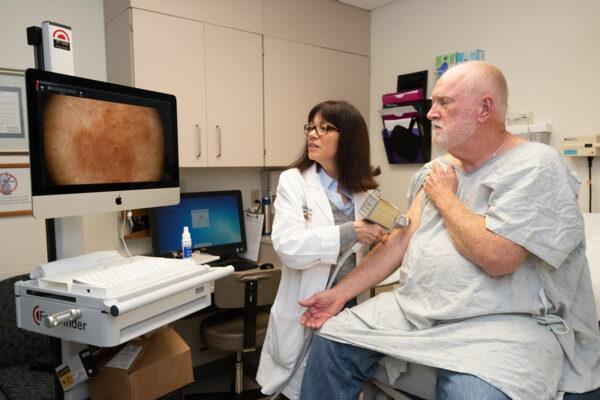Treating precancerous skin lesions prevents full-blown cancer

Credit: Washington University
A combination of two topical creams already shown to clear precancerous skin lesions from sun-damaged skin also lowers the risk that patients will later develop squamous cell carcinoma of the skin.
The study, from Washington University School of Medicine in St. Louis, Massachusetts General Hospital, and Harvard Medical School, appears March 21 in JCI Insight.
“Squamous cell carcinoma of the skin is the second most common cancer in the U.S., and its incidence is continuing to rise,” said Washington University dermatologist and study co-author Lynn A. Cornelius, MD, the Winfred A. and Emma R. Showman Professor and director of the Division of Dermatology. “This skin cancer and its treatment can be disfiguring, costly and even life-threatening, making it essential to improve preventive strategies.”
The therapy combines a cream formulation of a common chemotherapy drug called 5-fluorouracil with a synthetic form of vitamin D called calcipotriol. Standard therapy for the precancerous skin lesions — called actinic keratoses — is topical 5-fluorouracil alone. Calcipotriol is a standard therapy for psoriasis, an autoimmune disorder that causes red, scaly patches of skin.
The same research team has shown that calcipotriol activates the immune system’s T cells, which then attack the tumor cells. In a past clinical trial conducted at Siteman Cancer Center at Barnes-Jewish Hospital and Washington University School of Medicine, a combination of this immunotherapy plus chemotherapy cleared actinic keratoses better than standard chemotherapy alone.
The investigators obtained follow-up data for more than half of the 132 patients in the original clinical trial for up to three years after initial treatment. The researchers found that patients who had received the combination therapy had a lower risk of developing squamous cell carcinoma on the skin of the face and scalp than patients who had received standard therapy. Of 30 patients who received the combination therapy, two (7 percent) developed skin squamous cell carcinoma within three years. Of 40 patients who received standard therapy, 11 (28 percent) developed skin squamous cell carcinoma in the same time frame. This difference was statistically significant.
“This finding provides the first clinical proof-of-concept that an immunotherapy directed against premalignant tumors can prevent cancer,” said senior author Shawn Demehri, MD, PhD, of Massachusetts General Hospital and Harvard Medical School. “We hope our findings will establish that the use of premalignant lesions as personalized therapeutic targets can train the immune system to fight against the progression to cancer.”
The investigators, including first author Abby R. Rosenberg, a Washington University medical student, found that the therapy reduced the development of skin squamous cell carcinoma on the scalp and face but not the arms. They speculated that the topical therapies may penetrate the skin of the face and scalp more than that of the arms and induce a stronger immune response in those areas. The researchers also noted that this treatment regimen was relatively short — topical treatments were applied twice daily for four days — and a longer regimen may be necessary to be effective on the skin of the arms and other parts of the body.
###
Note: Cornelius and Demehri are co-inventors on a filed patent for the use of calcipotriol plus 5-fluorouracil for the treatment of precancerous skin lesions.
Media Contact
Diane Duke Williams
[email protected]




